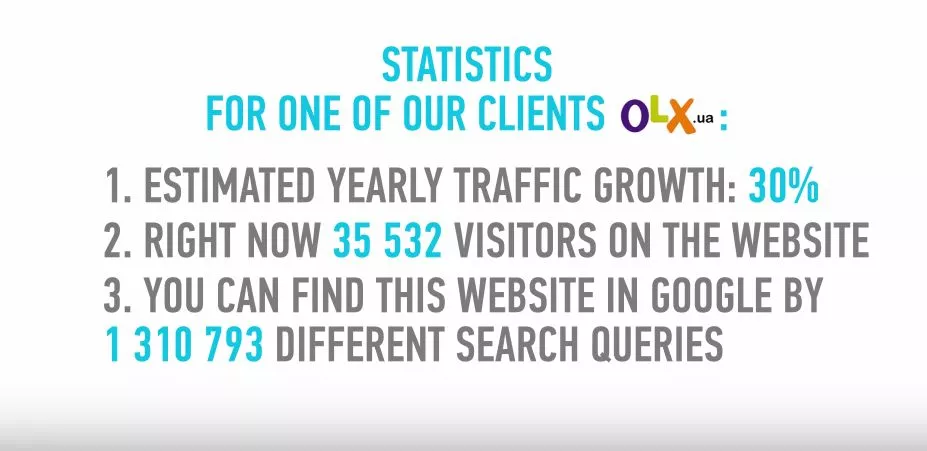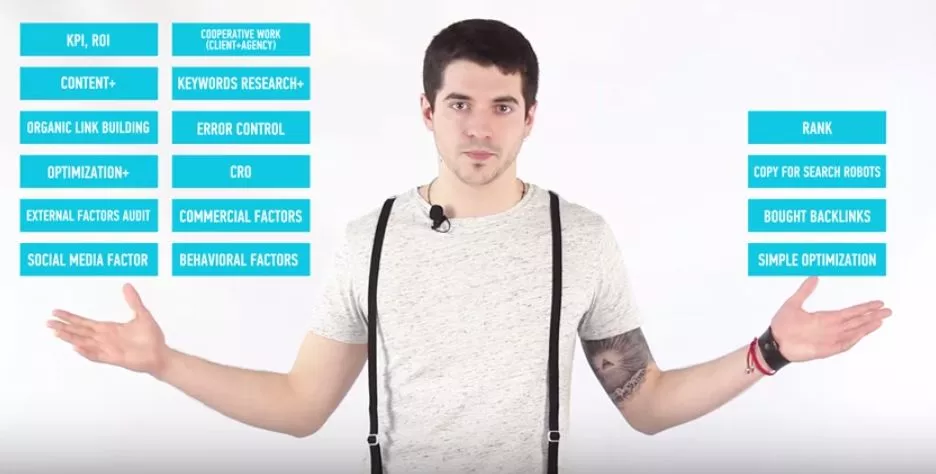Search engine use grows day by day. As users’ lives get more connected with Google and other search engines (according to Statista, there’s 1.17 billion people using Google; 292 million use Yahoo; 267 million use Bing) and all its features, SEO becomes a more valuable investment for businesses around the globe. If your entire customer base uses the internet (and probably a majority of your consumers do), what reason would there be not to use SEO? People are finding businesses every day; it’s just a matter of process to get found yourself.
[SEO of the past] and [SEO of the present]
The information is based on the accumulated knowledge from 1298 SEO projects, 484 of which are related to e-commerce.
Today we will talk about two completely different approaches to Search Engine Optimisation. Let’s divide these into two sections so we can compare them: [SEO of the past] and [SEO of the present]. And lets focus on the reason why many people think that SEO doesn’t work.
The most common delusions about SEO
Anyone who believes that SEO doesn’t work has been jaded by SEO of the past. Many companies, freelancers and in-house specialists are still trying to promote websites as if it were 2012. Their biggest problem is that they haven’t learned to adapt. They are way behind times. Here are some of the most common delusions about SEO.
1st delusion
You have to rank for the top 3 or top 5 most competitive keywords in order to be visible. Or even the top 50 keywords.
Well what if your website could be visible using 50 thousand search querier? How about 250 000?
Fact: two-thirds of search queries on Google are unique. They weren’t there before, and there are no statistics for them. That means there is no need to get on Google with generic, competitive keywords.
Google now looks for the most relevant website based on a user’s search. And since most queries are unique, there’s no point in struggling to get on top with something like “dentist new york” or “cool t-shirts online”. It’s not on what page your website shows up. It’s how many people visit your website and convert into buyers.
[SEO of the past] prefers website promotion using keywords. [SEO of the present] is about improving your website’s visibility in its niche, and making your website relevant to users as much as possible under the rules of Google’s search algorithms. Do not focus on a few competitive search phrases! Being on the first page is not as important as being relevant, since relevant website will bring traffic for unique queries. Set goals to increase sales, not ranking.
2nd delusion
You have to buy thousands of backlinks and publish keyword-stuffed articles to help you get to the top of Google and get more users to your site.
Again. That was OK with SEO of the past. Not anymore ^_^ The task of an SEO specialist isn’t to deceive the system, but to make it clear to the search robot why your site can be useful to users. Search engines have become smarter. There are now more than 300 indicators that affect site rankings. That means there is no point in trying to fool search engines. A website should aim to be as helpful to users as possible. [SEO of the past] cared about search engine robots. All work was carried out to cater to the robots’ standards. [SEO of the present] always has the user in mind. At the same time, search engines' recommendations are implemented whenever possible.
Stop trying to fool search robots! This will eventually get your website penalized by Google. As a result, the website’s traffic and profitability will be decreased.
In the next episode I’ll tell you how to achieve results in SEO these days. Subscribe, Ask questions, Make money.
Related Articles
How to Set Up Consent Mode in GA4 on Your Website with Google Tag Manager
Let's explore how to properly integrate consent mode in GA4, configure it for effective data collection, and at the same time comply with GDPR and other legal regulations
Display Advertising Effectiveness Analysis: A Comprehensive Approach to Measuring Its Impact
In this article, I will explain why you shouldn’t underestimate display advertising and how to analyze its impact using Google Analytics 4
Generative Engine Optimization: What Businesses Get From Ranking in SearchGPT
Companies that master SearchGPT SEO and generative engine optimization will capture high-intent traffic from users seeking direct, authoritative answers





